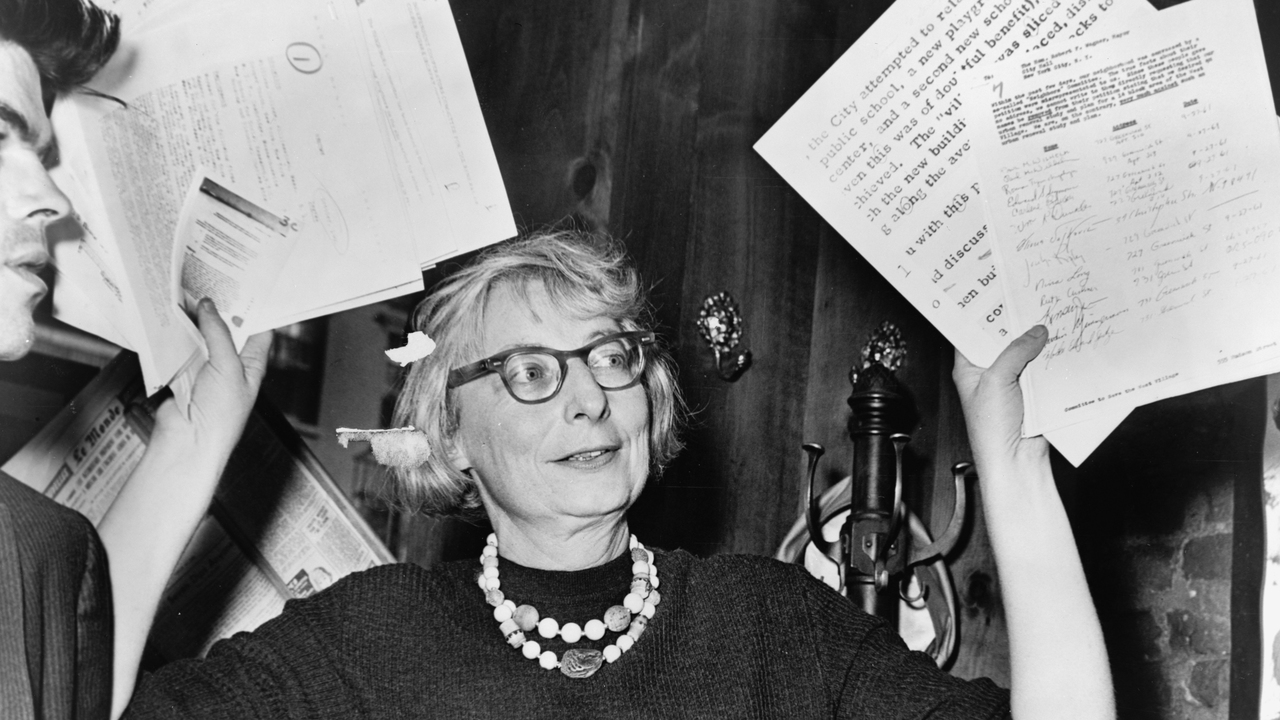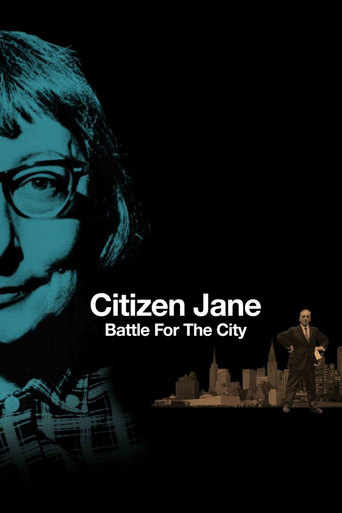



Let's be realistic.
A lot of fun.
Mostly, the movie is committed to the value of a good time.
View MoreThis is ultimately a movie about the very bad things that can happen when we don't address our unease, when we just try to brush it off, whether that's to fit in or to preserve our self-image.
View MoreWriter/Journalist/Urban Activist: Jane Jacobs is the main subject of this documentary as it focuses on her battles against rapid redevelopment headed by urban planner Robert Moses in her home city of New York during the 1950s and 1960s.This film ably conveys Jacobs' intelligence in various ways: her unusual yet fascinating observations on how cities truly work (there is order within the 'chaos'); and her abilities to organize activist responses to proposals that negate city living. Her views and philosophies are expressed in various ways. They include audio and televised footage as well as the narration (by Marisa Tomei) from Jacobs' book "The Death and Life of Great American Cities" (1961).The viewer could end up feeling a mixture of optimism as well as pessimism from the history exposed in this film. On the one hand, Jacobs' victories (with much help) give hope. But there is despair after viewing the chronicling of "slum" neighbourhoods with vibrant communities being destroyed and replaced with housing projects that caused more problems than they solved. One feels grief not only for the loss of vibrant communities but also for the historical buildings that were destroyed - and replaced with bland ones.Jacobs moved to Toronto (where I've lived for over twenty years) in 1968 and was involved in a successful campaign to stop an expressway being built in the downtown area in the early 1970s. One can only wonder (and shudder) what she would think of the current state of this city since her passing in 2006 at the age of eighty-nine.She believed in progress as long as it mixed the old with the new and kept street life active. Downtown Toronto is losing many small shops, restaurants, and bars as they are being torn down for more and more massive glass condos. (It's strange to think that such blandness will be considered 'historical architecture' in the future.) During this process, sidewalks adjacent to the future condo sites have been reduced. So much for encouraging the street life so well lauded in this documentary. Also, in regard to condo buildings that have shops at ground level, they seem to have very little activity within them. (A similar point is made in "Citizen Jane" about parks near housing projects that were frequently empty.)Director Matt Tyrnauer has used the right mix of interviews, old footage, and music to make a fine film even for those of us who have minimal knowledge of urban issues. The footage of street life goes back to earlier decades - even as far back as the 1930s. The music by Jane Antonia Cornish has an edge that is usually used in thrillers. Perhaps, this is to imply that the monstrous mindset of the 50s and 60s has an equally evil grandchild (condo-ization aka vulgarization) in our current times that is taking over our lives today.....and we're all in that scary movie!In any case, this movie is encouraging me to read "The Death and Life of Great American Cities". From the quotes in this movie, the book still sounds relevant today - more than half a century since it was published.
View MoreCitizen Jane documents the battle between Urban Renewal and Urban Preservation, focusing specifically on post-WWII era New York City. It's painted as a classic David v Goliath story in which reporter/activist Jane Jacobs pits herself against the well-connected developer Robert Moses. It isn't a particularly suspenseful documentary - if you know anything about the current layout of Manhattan, you know the outcome - but it's still a highly educational piece that highlights many of the ongoing debates in the world of urban planning.Those living in small towns or rural areas may not get too much out of this doc, but anyone living in a major city will easily relate to its themes. If I have one complaint, it's that the filmmakers worked a little too hard to paint Moses as a villain. They touch a bit on his early idealism, but then lean into the portrayal of him as a greedy bully. Perhaps he was simply blind to the damage he was doing in his quest to re-build the slums and tenements? I suppose it's a compliment to say that this documentary left me wanting to know more.
View MoreJane Jacobs and the successful battle to oppose Robert Moses' planned lower Manhattan expressway in the 1960s is the focus of this doc, but the film also raises general questions about the overreach of city planners who are too quick to tear buildings down and not very wise about the new buildings and highways that go in their place.It's a huge topic, so it was wise to focus here on Manhattan, where enough forms of political greed and poor planning took place to document the folly that went into projects that were completed, like the Cross-Bronx Expressway, along with some that weren't, like the prospect of bringing urban renewal to the West Village.Lots of footage Moses, Jacobs, and the wrecking ball and we'll put together from beginning to end.
View More"Citizen Jane - Battle for the City" (2017 release; 92 min.) is a documentary about Jane Jacobs, and opens with a quote from her 1961 classic book "The Death and Life of Great American Cities". In the movie's introduction, we are reminded that urbanization is increasing at record pace (along with stunning photography of some of the world's largest cities). We then go back in time and are introduced to Robert Moses, a New York politician and head of the NY Committee of Slums Clearance (among many other Committees). It is on Moses' behest that New York is massively redoing certain parts of the city, not just to 'clear the sums' but also to make way (literally) for the American car. Jane Jacobs, a journalist by trade, observes it all, and starts developing a radically different approach. Then one Moses threatens to 'redo' the West Village/Greenwich Village area, where Jacobs lives... To tell you more of the story would spoil your viewing experience, you'll just have to see for yourself how it all plays out.Couple of comments: this is the latest documentary from director-producer Matt Tyrnauer. Here he tackles the subject matter of urban design, something I am not an expert in but very much interested in (having lived in large cities most of my life). While the battle between Moses and Jacobs rages, we see fascinating archive footage of what certain sections of New York looked like, before they were rebuilt/destroyed (take your pick). Sizeable attention is given to the rise (and eventual demise) of massive and cookie-cutter "public housing" complexes from the 50s and 60s. Late in the documentary, someone observes :China today is Moses on steroids". If you have visited China, it's impossible to miss these complexes, based on what we did here in the US half a century ago (and knowing that they eventually failed). Tyrnauer has tons of interviews spliced throughout the movie. Last but certainly not least, there is a delightful (and Philip Glass-reminding) original score, composed by Jane Antonia Cornish."Citizen Jane - Battle for the City" opened this past weekend at my local art-house theater here in Cincinnati. The Tuesday evening screening where I saw this at was attended so-so (but of course it was a weeknight). I hope good word-of-mouth will carry this documentary forward, be it in the theater, on Amazon Instant Video, or eventually on DVD/Blu-ray. If you love a good documentary and/or are interested in urban design, you cannot go wrong with this. "Citizen Jane - Battle for the City" is HIGHLY RECOMMENDED!
View More